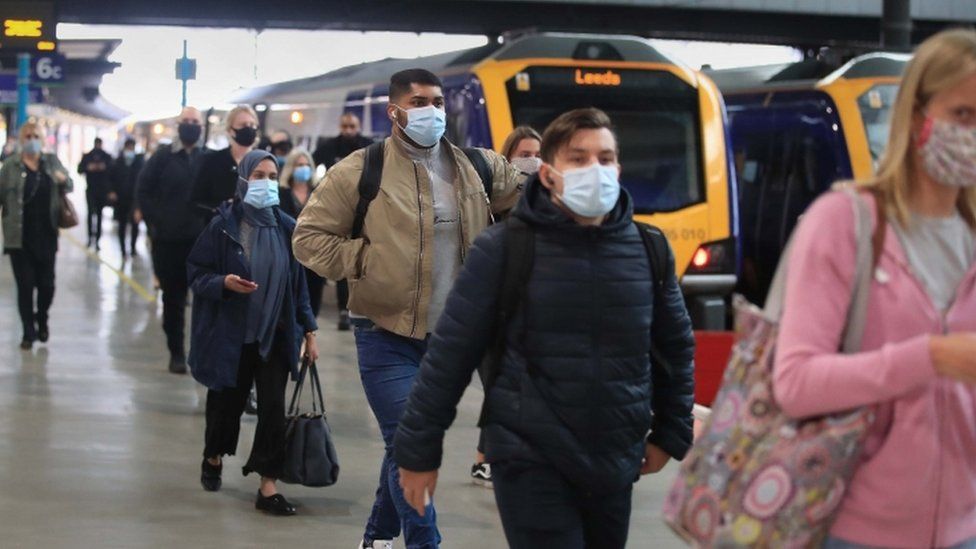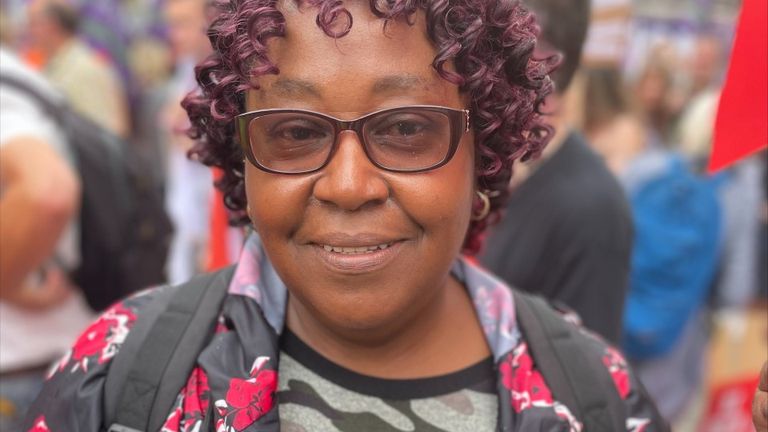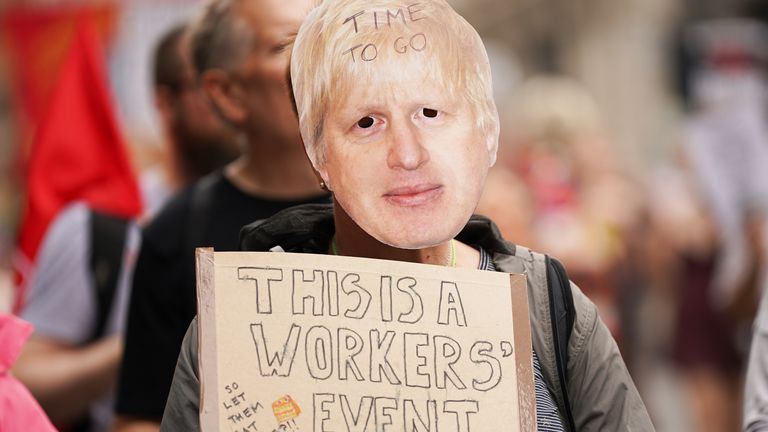This video can not be played
To play this video you need to enable JavaScript in your browser.
It is not for the government to intervene to stop rail strikes, the transport secretary has said - despite unions calling for talks.
Grant Shapps said the RMT's request for a meeting was a "stunt" and said the union had been "determined to go on strike".
The union said politicians were failing to prevent its three days of industrial action next week.
Labour claimed ministers wanted the strikes to go ahead to "sow division".
Strikes will take place on almost all major lines across Britain on Tuesday, Thursday and Saturday, as well as on the London Underground on Tuesday.
There will also be knock-on effects on services on non-strike days, including Monday.
Network Rail has advised people to travel only if necessary on strike days. A special timetable will be in place across England, Scotland and Wales from Monday until Sunday.
Mr Shapps said negotiations had to take place between unions and employers - rather than ministers - and accused the RMT of "trying to create some sort of class war".
"In any pay discussion, in any negotiation over terms, over in this case modernisation, it's always the employer and the union who need to get together to speak," he said.
Although most rail operators are not owned by the government, they are not entirely independent.
The government provides subsidies to the network - including £16bn to keep the railways running during the pandemic - and Network Rail, which owns the tracks and other infrastructure, is government-owned.
Speaking to BBC Radio 4's Broadcasting House programme, the RMT's Mick Lynch claimed rail operators were refusing to sit down for discussions.
And he said Network Rail, as part of the public sector, was being influenced by government ministers.
"It's Shapps, [Boris] Johnson and Rishi Sunak who are stopping a deal being done in this dispute," he said.
But Network Rail - whose workers are due to strike - said the RMT were dismissing talks before they had finished.
Steve Montgomery, who chairs the Rail Delivery Group of operators, said it was clear the industry could not keep asking the taxpayer to fund it.
"Instead of striking, we need the RMT leadership to work with us to secure a deal that is fair to our staff, fair to our passengers and fair to taxpayers," he said.
Labour's shadow levelling-up secretary Lisa Nandy told BBC Sunday Morning the government had got to "get round the table" with rail workers and said it was "simply not good enough" that ministers had not met unions since 8 March.


The blame game is in full swing ahead of next week's strikes - the biggest on the railways in a generation.
The RMT says it is taking action to protect fair pay, conditions and to prevent job cuts. Other unions are warning they might take industrial action too if they don't get pay deals they deem to be acceptable. They believe inflation means a decent pay rise is essential.
But the government is up for the fight. Grant Shapps has been scathing of the RMT, saying its leadership seems to want a class war.
Treasury ministers also warn that if pay goes up too much, it could just make inflation worse.
The government says it wants to avoid the strike - but in cynical political terms, a row with a left-wing union is comfortable political ground for the Conservatives.
It's more tricky for Labour. The party's leadership says it doesn't want next week's strike to happen.
But is it backing the striking rail workers? There's been no definitive answer.
How much is a fair pay rise? That's for the negations, the party says.
Labour says everyone should get back around the table and find a way to avoid the strike - critics will see that as fence-sitting.

The RMT - which has 40,000 members across the rail network - has said its members are unhappy about stagnated pay and proposed job losses.
Mr Lynch denied the union was demanding a pay hike in line with the current RPI inflation rate - which was 11.1% in April - but said any proposed rise must reflect the higher cost of living.
He pointed out to Sky News that RPI in December, when he said a deal with Network Rail should have been struck, was 7.1%.
Mr Lynch earlier said the union had rejected a Network Rail offer of a 2% rise with a further 1% increase linked to job cuts. The RMT recently won an 8.4% pay rise on the London Underground, it said.
This video can not be played
To play this video you need to enable JavaScript in your browser.
Meanwhile, Labour leader Sir Keir Starmer used a speech at a Labour event in Warwick to suggest Mr Shapps and Prime Minister Boris Johnson wanted the strikes to go ahead.
"They want the country to grind to a halt so they can feed off the division," he said.
Sir Keir said the strike would mean businesses would struggle with freight, schools exams would be hard to get to and hospital appointments would be missed.
"That's why I have said the strikes should not go ahead," he said.

Rail strike basics
- When? There will be rail strikes on Tuesday, Thursday and Saturday and a London Underground Strike on Tuesday
- Where? Many lines will face disruption including: Avanti West Coast; C2C; Chiltern Railways; Cross Country Trains; Croydon Tramlink; Greater Anglia; LNER; East Midlands Railway; Elizabeth Line; Great Western Railway; Hull Trains; London Underground; Northern Trains; South Eastern Railway; South Western Railway; TransPennine Express; West Midlands Trains.
- Who? The RMT union's members include everyone from guards and catering staff to signallers and track maintenance workers. Train driver members of the Aslef union will be striking on Thursday and 2 July on Greater Anglia and 28, 29 June and 13, 14 July on Croydon Tramlink.
Read more here.

Liberal Democrat transport spokesperson Sarah Olney said Mr Shapps "hasn't even met with the union bosses for well over a month".
"Not bothering to avert a crisis is a sackable offence in any other workplace," she said.
A Department for Transport spokesperson warned the railway industry, which had received £16bn support from the government during the pandemic, was "still on life support" with passenger numbers down 25%.
They said train travel was now a choice - not a necessity - and strikes could risk losing customers in the future.

How are the rail strikes affecting you? Do you rely on trains? Are you having to make alternative travel arrangements? Will you miss an important event? Get in touch by emailing: haveyoursay@bbc.co.uk.
Please include a contact number if you are willing to speak to a BBC journalist. You can also get in touch in the following ways:
- WhatsApp: +44 7756 165803
- Tweet: @BBC_HaveYourSay
- Or fill out the form below
- Please read our terms & conditions and privacy policy
If you are reading this page and can't see the form you will need to visit the mobile version of the BBC website to submit your question or comment or you can email us at HaveYourSay@bbc.co.uk. Please include your name, age and location with any submission.

- 'THEY ESCAPED THE TALIBAN': The extraordinary story of the Afghanistan women's football team
- GRENFELL: Five years on, has anything changed?

https://news.google.com/__i/rss/rd/articles/CBMiJmh0dHBzOi8vd3d3LmJiYy5jby51ay9uZXdzL3VrLTYxODU0NTY30gEqaHR0cHM6Ly93d3cuYmJjLmNvLnVrL25ld3MvdWstNjE4NTQ1NjcuYW1w?oc=5
2022-06-19 14:58:10Z
1466832808


